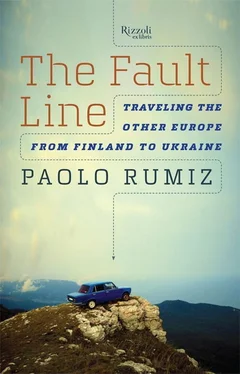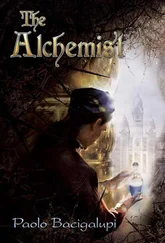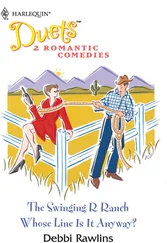Vadim: “Really? What pigs.”
Jura brings to the table a loaf of bread fresh out of the oven. It has an incision on the top in the form of a cross. He asks me, “What do you do for work?”
I tell him I write.
“Well, then, be sure to write good things about us. Listen, would you like a fish? We’ve got a refrigerator full.” He opens the fridge and pulls out a bucket of pickled fish. He takes one out and wraps it, still dripping, in newspaper and hands it to Mariusz.
I tell them about the present of the dried cod we were given in Kirkenes by the Russian Nikolai, the captain of the fishing boat, that guided our glorious crossing of the most difficult border in Europe. “Of course they had to let you through.”
Jura laughs. “Fish don’t need visas.” Right, just try to build a fence in water.
Water is the last free space in this world, where everything is privatized and stolen.
We go out to the lake. A skein of geese is crossing the road to go drink. Another fantastic treasure of Slavic peasant culture.
Jura: “Mind you, don’t ever call a lady a goose. It’s an offense to the goose. Geese are hyperintelligent. If a platoon of five hundred geese perceives a threat, they divide up into small groups. They keep pastures like golf fairways because they don’t tear out the grass but clip it with their sawtooth beaks. And if they get rankled, they know how to defend themselves. That beak is worse than three bee stings. To get the better of them, a predator has to attack at night, cut their throats, and leave them to bleed to death. The fox and the rosomakha know that perfectly well.”
I tell them that the goose was introduced into the cuisine of our Po Valley by Jews who came there from Poland. While the Christians celebrated the end of the harvest in November by roasting a pig, the Jews, on the feast of Saint Martin, November 11, sacrificed a goose. Today goose has become a dish of fine restaurants, and it is said that those who don’t eat it on Saint Martin’s Day won’t earn the “beak of a penny.” [5] The original expression is “non guadagnerà un becco di un quattrino.” A quattrino was a coin minted in the Grand Duchy of Tuscany in the 1300s. As the name indicates, its value was four denari or four cents. Becco , “beak,” is the term used in numismatics to describe a pointed imperfection that sticks out on the circumference of the coin. The expression un becco di un quattrino —“the beak of a quattrine”—is roughly the equivalent of a “red cent,” referring to a copper penny.
Vala: “Look, Petrovich, look at the wonder of our Onega. Here there’s no need for cinema or TV. You just enjoy the lake. Look at how the old wooden houses turn red at sunset. Architects from all over the world come here to study them.”
Me: “Rather than architects, what the houses needed are some good carpenters to fix them up. There’s an extraordinary cultural heritage here that is going to ruin for lack of maintenance.”
Jura: “True, we can see them falling apart right before our eyes. They’ve been officially designated as historical monuments, so the owners are not allowed to do any work on them. Look at the house owned by Yevgeny and Alida Pechugin, that one behind ours. One day the broken part pulled back and brought the sound part with it, and the whole thing collapsed. People here don’t have the money to do the kind of restoration that the preservation authorities would like.”
My God , I think, the mechanisms of swindling are the same everywhere. Simple and predictable. Yet nobody does anything about it. Not in Italy, either .
Farewells, kisses, wishes for the future. Jura waves his arms high and wide from the door to the steaming banya , his towel around his neck. He has to work off a flask of vodka with a nice long sweat. The potatoes and the firewood will have to wait till tomorrow. We walk back to the Wilk house, fish in hand, and for the entire four-mile trek, each of us will be enveloped by a swarm of mosquitoes, instantly awakened by the smell of our warm bodies and the pickling. We wave our arms comically and uselessly to keep them away. “In another week, it’ll be a lot worse,” Mariusz consoles us.
On the edge of the woods, on the right, the remains of the sovkhoz “Progress” come into view, stripped bare by privatization as though by a plague of grasshoppers. Until the 1990s, it was thriving and prosperous and was known as the Millionaire. Now the roof is gone, and most of the bricks have been stolen. Its cowsheds used to house more than two thousand dairy cows. Today, says Wilk, they call it the City of the Dead. Only oblivion can save this town from the fury of the thieves. Churches, farms, izba s; they would carry everything off. The Church of Santa Barbara, five centuries old, has been saved only because nobody knows about it, and you can get to it only by boat, in a hidden corner of Lake Yandoma, about twelve miles from Velikaya Guba.
Monika has started up conversation with a peasant woman named Gala, bent over at the end of a little dock on the lake, about fifty feet away from her little wooden house. She’s intent on activating the pump she uses to water her vegetable garden. She tells Monika that her mother died recently and she has been left alone with her garden. “Come in,” she tells her, and she invites her in to see her treasures, all affectionately addressed by diminutive nicknames: taters, carotelles, strawbabies, peasies, and so on. “Explain to your readers that it’s a sin not to cultivate the earth,” she says to Monika, and her elementary truth startles me. Why don’t our priests thunder from the pulpit against this first of all sins? Why don’t they say that the earth will go to ruin from abandonment? Gala explains that the watering has to be done with care. This plant shouldn’t be drowned; this one, on the other hand, can be watered abundantly. A complicated geography of dedication, concentrated in an Eden no larger than nine hundred square feet at most.
Slogging through the mud on the way home, we talk lightly about heavy subjects, such as the sense of returning, the special dreams of the traveler, and the polar vision of the world, which belies the pretended grandeur of empires.
We go through them one after another like fresh cherries. With our salted fish as our trophy, we talk about the difference between a traveler and a vagabond, about Taoism as the definitive expression of shamanism, about the relationship between the sweetness of the countryside and the vocalic softness of the Russian language. Then, once again, about the concept of the frontier, of borders, of this Europe of ours seen longitudinally, and finally, the theme of the difficult separation from the book, the father of all imaginable journeys, which, when the time comes for you to go off to confront the world on your own, can become a sort of cumbersome ballast.
The conversation continues around a table covered with all manner of God’s bounty: canapés with slices of hard-boiled egg, cheese, beer, cucumbers, beets, and Jura’s salted fish, nicely laid out on a serving dish with chives. Just before midnight, when a fantastic yellow light invades the room, illuminates every crumb left on the tablecloth, and lights up the deep womb of the stove, Mariusz unloads on the table a mountain of books, a worthy dessert after such a marathon of ideas. The mountain is made of fifteen illustrated editions of a single work, the Kalevala , the Iliad of the North, a gargantuan serving of epic that would make any Lord of the Rings look pale by comparison. A fluvial composition, made for these woods and conceived in these woods. It was on the shore of this lake, Mariusz Wilk recounts, that the pechka builders and the taciturn people of woods came together to define themselves reciprocally and generate fascinating bastard fruits.
Читать дальше












